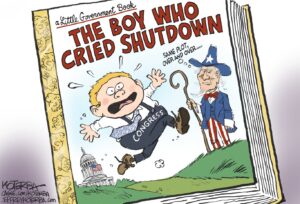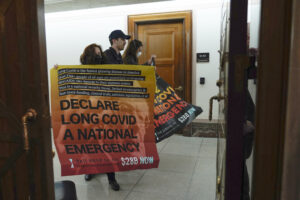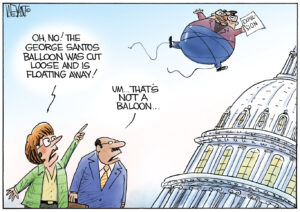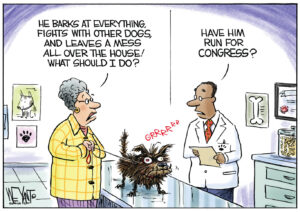Like It or Not, Health Care Mandate Is Constitutional
Law students may debate whether Congress has the right to mandate health insurance, but in the real world, it's not a big worry.Is Congress going through the ordeal of trying to enact health care reform only to have one of the main pillars — requiring individuals to obtain insurance — declared unconstitutional? An interesting debate for a constitutional law seminar. In the real world, not a big worry.
“This issue is not serious,” says Walter Dellinger, acting solicitor general during the Clinton administration.
But it’s being taken seriously in some quarters, so it’s worth explaining where the Constitution grants Congress the authority to impose an individual mandate. There are two short answers: the power to regulate interstate commerce and the power to tax.
First, the Commerce Clause. Spending on health care consumes 16 percent –and growing — of the gross national product. There is hardly an individual activity with greater effect on commerce than the consumption of health care.
If you arrive uninsured at an emergency room, that has ripple effects through the national economy — driving up costs and insurance premiums for everyone. If you choose to go without insurance, that limits the size of the pool of insured individuals and — assuming you are young and healthy — drives up premium costs.
The clause empowers Congress “to regulate commerce … among the several states,” which may not sound terribly sweeping. But since the New Deal, the Supreme Court has interpreted this authority to cover local activities with national implications.
In the 1942 case Wickard v. Filburn, the justices ruled that even though an activity may “be local and though it may not be regarded as commerce, it may still, whatever its nature, be reached by Congress if it exerts a substantial economic effect on interstate commerce.”
Thus, the court said, Congress was entitled to tell Roscoe Filburn how much wheat he could grow to feed his own chickens. Surely, then, Congress could require Filburn’s grandson to buy health insurance.
The court has narrowed the reach of the Commerce Clause in recent years — but also reaffirmed Wickard. The times it has found that Congress overstepped involved situations where the connection to interstate commerce was strained: carrying guns near schools or engaging in gender-based violence.
In United States v. Lopez, the court found that the Gun-Free School Zones Act “is not an essential part of a larger regulation of economic activity, in which the regulatory scheme could be undercut unless the intrastate activity were regulated.”
The individual mandate is “the mirror image of Lopez as a Commerce Clause case,” says Harvard Law School professor Laurence Tribe.
Granted, there is a difference between regulating an activity that an individual chooses to engage in and requiring an individual to purchase a good or service. Granted, too, there is a difference between making automobile insurance compulsory, as a condition of the privilege to drive a car, and making health insurance compulsory, whether an individual wants it or not.
But the individual mandate is central to the larger effort to reform the insurance market. Congress may not be empowered to order everyone to go shopping to boost the economy. Yet health insurance is so central to health care, and the individual mandate so entwined with the effort to reform the system, that this seems like a different, perhaps unique, case.
Congress clearly has authority to, in effect, require employees to purchase health insurance for their old age by imposing a payroll tax to fund Medicare. It’s odd for the same conservatives bemoaning a government takeover of health care to complain about requiring that people turn to the private marketplace.
Which brings us to the alternative source of congressional authority, the “Power to lay and collect Taxes, Duties, Imposts and Excises.”
The individual mandate is to be administered through the tax code: On their forms, taxpayers will have to submit evidence of adequate insurance or, unless they qualify for a hardship exemption, pay a penalty.
Yale Law School professor Jack Balkin likens this to Congress raising money for environmental programs by taxing polluters. “Congress is entitled to raise revenues from persons whose actions specifically contribute to a social problem that Congress seeks to remedy through new government programs,” he concludes.
Balkin cites a 1950 Supreme Court case upholding a tax on marijuana distributors. “It is beyond serious question that a tax does not cease to be valid merely because it regulates, discourages, or even definitely deters the activities taxed,” the court said. “The principle applies even though the revenue obtained is obviously negligible, or the revenue purpose of the tax may be secondary.”
Sounds like the individual mandate to me.
Ruth Marcus’ e-mail address is marcusr(at symbol)washpost.com.
© 2009, Washington Post Writers Group
Your support matters…Independent journalism is under threat and overshadowed by heavily funded mainstream media.
You can help level the playing field. Become a member.
Your tax-deductible contribution keeps us digging beneath the headlines to give you thought-provoking, investigative reporting and analysis that unearths what's really happening- without compromise.
Give today to support our courageous, independent journalists.






You need to be a supporter to comment.
There are currently no responses to this article.
Be the first to respond.